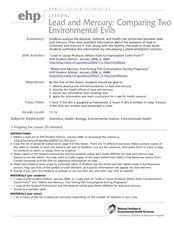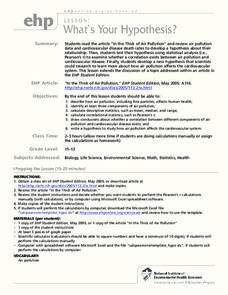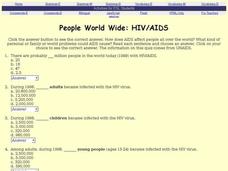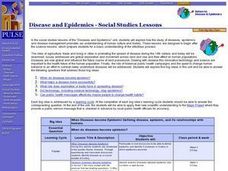Curated OER
Death by Particles
Emerging epidemiologists define relative risk and read an article about the effect of particulate pollution on the cardiovascular health of women. They record the relative risk values, graph them, and answer analysis questions. This is a...
Curated OER
Obesity
Class members participate in a discussion, read a newspaper article, and participate in activities meant to open their eyes to the problem of obesity in the US. There are resource links, electronic worksheets, and teacher's notes to help...
Curated OER
Mothers' Milk-Unleaded, Please
Lead toxicity is a hot topic these days, especially when it was a common component in household paint for many years. In Taiwan, there was concern that babies were being exposed to toxic levels of lead through breast milk. A study was...
Curated OER
When Something's Missing: Diagnosing Vitamin Deficiencies
The New York Times "Education" section posts an extensive lesson on vitamin and mineral deficiencies. It involves class discussion, examination of food packaging labels, and the reading of a blog post about Vitamin D. The highlight of...
Curated OER
Exploring Dietary Guidelines and Healthy Eating Patterns
How nutritious is a tiny lollipop? Pass them out to your class as they view a PowerPoint presentation on the basics of nutrition. The students measure and record their weight and height and then carry out a computer activity using their...
Curated OER
The Case of the Contaminated Maize
Environmental health students read about an outbreak of aflatoxin poisoning with the intent to examine the stages of an epidemiologic investigation. As they read the case study, they identify where the outbreak occurred, form a...
Curated OER
A Yen for Maximum Residue Limits in Food
Future public health officials or agriculturists read an article and answer questions concerning the Japanese regulations for pesticide exposure. They compare the maximum residue limit for two, 4-D of Japan with other countries. This is...
Curated OER
Lead and Mercury: Comparing Two Environmental Evils
High schoolers in chemistry or health courses look at the material safety data sheet (MSDS) and periodic table of elements to gather information about mercury and lead, two toxic materials that have been found in food products. They read...
Curated OER
What's Your Hypothesis?
Find the article, "In the Thick of Air Pollution," not through the resource link in the lesson, but through an Internet search. Have high schoolers read it and perform calculations with the statistics provided. The objective is to...
Curated OER
Cross Out Secondhand Smoke
After reading a public health article, high schoolers identify groups that are at risk from secondhand smoke and what benefits have come from reduction of smoking in public places. The article isn't accessible via the link, but can be...
Curated OER
Three is a Toxic Number
Future public health advocates read a case study of a combination of water pollutants that may be linked to autism. The class is split into three groups, one to research each of the suspected chemicals. The look at how each one affects...
Curated OER
Choose Your Own Adventure: School Nutritional Policy
Mature audiences are required for this instructional activity on implementing health-related policies. First, they openly explore the CDC obesity page while taking notes about what they discover. Then they view a PowerPoint about the...
Curated OER
Controlling the Pandemic: Public Health Focus
Students examine global issues centered around HIV and AIDS. In this health science lesson plan, students compare and analyze public health measures and factors that affect the treatment of HIV/AIDS. They examine the role of...
Curated OER
Cancer Research
Students participate in a class demonstration to see how many Americans are affected by cancer in their lifetime. In this public health lesson, students are placed in situations that allow them to experience how relevant cancer research...
Curated OER
People World Wide: HIV/AIDS
In this HIV and AIDS worksheet, students answer ten multiple choice questions about the populations most affected by HIV and AIDS, the costs to aid people with the disease and the number of people affected in 1998 by the disease.
Curated OER
Pyrethroid Panic?
Future public health officials read about the exposure to pyrethroid pesticides and analyze box plots of pesticide use, diet, and children's ages. They discuss whether or not there are any relationships in the data. If you feel this...
Curated OER
Is This Really Okay for Me? A Public Health Statistical Analysis
Future public health consultants are asked in a letter to help determine if a fictitious drug is causing birth defects in a population. They perform a simulation using beans and probability calculations to come to a conclusion. Note that...
Curated OER
That Was Then, This Is Now
Fifth graders examine the world power of the United States. In this Social Studies instructional activity, 5th graders choose a world issue and identify ways the United States could help to solve the situation. Students determine the...
Curated OER
Public Health - Merit Badge Workbook
In this Boy Scout public health merit badge workbook lesson, students complete 6 pages of short answer questions in which they describe diseases that effect public health. They determine what treatments are available and how they can be...
Curated OER
Then and Now. Public Health from 1900 to Today
Students analyze public health issues. In this public health activity, students research Internet and print sources regarding the health concerns and diseases of the 20th and 21st centuries. Students also interview medical practitioners...
Curated OER
Using Maps to Make Public Health Descisions Case Study: Harmful Algal Blooms in the Gulf of Mexico
Students are introduced to GIS and its uses. Students participate as public health scientists to deliberate a course of action to explore possible research questions. Pupils interpret spatial data, and make predictions based on GIS data,...
Curated OER
Disease and Epidemics
High schoolers explore how the study of diseases, epidemics and disease management offers opportunities for exploration of biological evolution, immune systems, interaction between humans and their environment, and interaction among...
Curated OER
Disease and Epidemics - Social Studies
High schoolers explore how the study of diseases, epidemics and disease management promotes our understanding of human culture and history. They also examine the roles of agriculture, trade and living in cities in promoting the spread of...
Curated OER
From Lake to Tap
Students use the Internet to study how water is treated to make it safe to drink. They use a tutorial on the U.S. Environmental Protection Agency's website to gain this information. They complete a worksheet for the assessment portion...

























